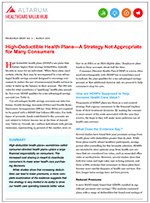High-Deductible Health Plans: A Strategy Not Appropriate for Many Consumers
High-deductible health plans—sometimes called consumer-directed health plans—place a large financial responsibility on consumers. The increased cost sharing is meant to incentivize consumers to make wiser healthcare purchasing decisions.
While studies show that increasing deductibles can lead to lower premiums, a more complete examination of the evidence suggests that this strategy is very limited in its ability to drive our healthcare spending towards better value. Several studies show that consumers purchase less of both low-value and high-value care, and there is little evidence that consumers in these plans have become more careful shoppers of healthcare services. Available evidence also suggests that consumers don’t approach purchasing healthcare like other commodities and they are reluctant to purchase medical care based on price. HDHPs are a blunt instrument that may save money in the short term, but often at a high cost for consumers who find the cost-sharing unaffordable or who don’t understand the benefit design well enough to get the care they need.
| Download the PDF of this report by clicking here. |







